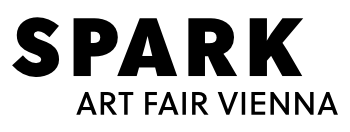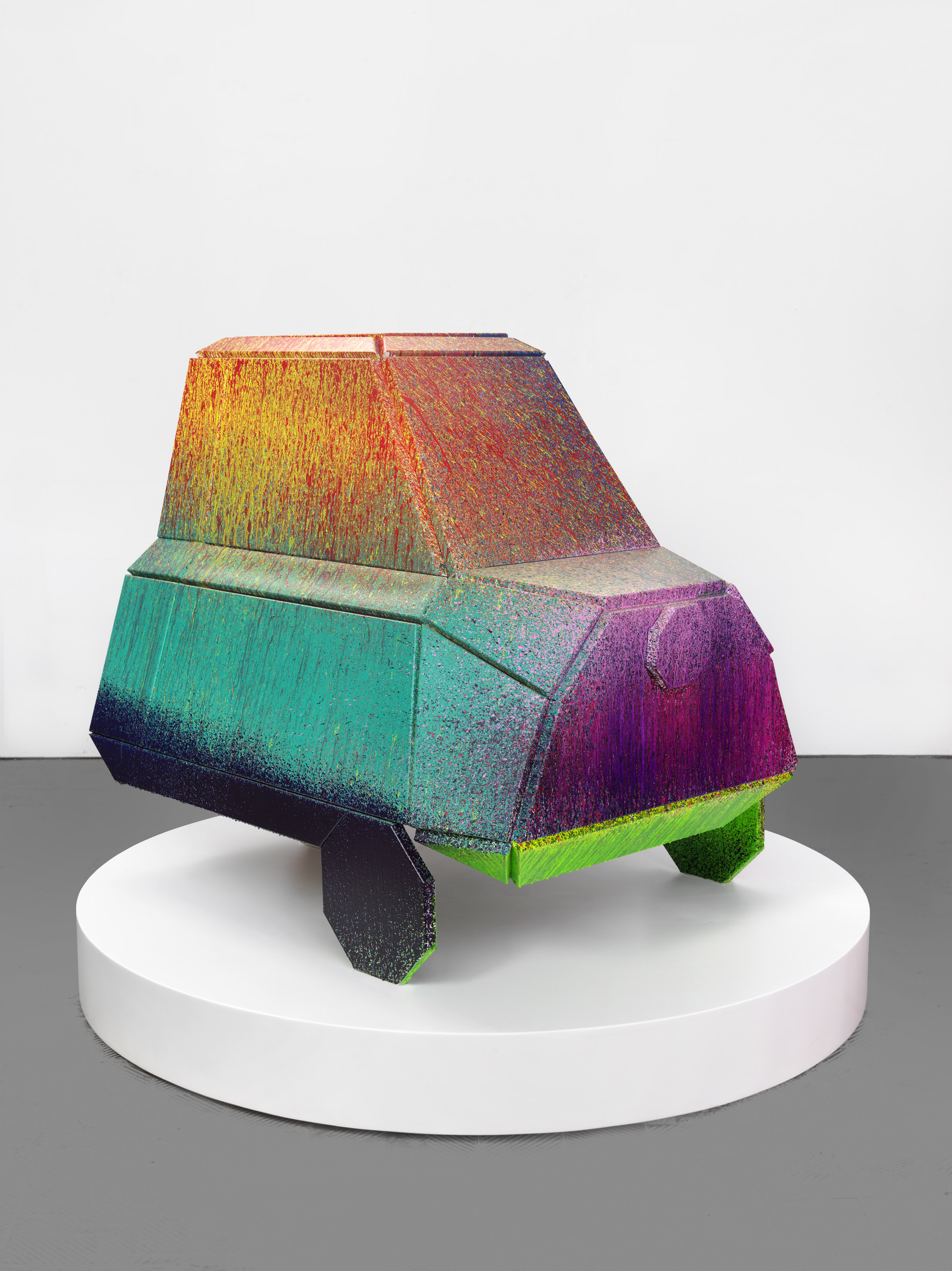Galerie nächst St. Stephan Rosemarie Schwarzwälder
Daniel Knorr
Daniel Knorr transformed a car wash into a “painting machine” for the first time in his performance Laundry at the 2019 Art Basel Unlimited. In place of a paintbrush, this large instrument was used to paint the car models made of canvases. As the brushes spun frantically, the clean, white canvases became covered in wild splashes and streams of paint, reminding us after one or two rides through the car wash of action paintings or the results of a modernist happening. While the emphasis in Laundry was on the performance, further works relying on this process have emerged in the last few years that draw our focus more toward the canvases and the “cars” into which they are transformed.
Spare Parts Peel P50 is Knorr’s latest work using this method and consists of canvases acting as regular and spare car parts that can be assembled into the smallest car in the world, the Peel P50. This automobile, which is the tiniest industrially manufactured car ever made, was built in the 1960s and mirrors the size of the driver. At the time, it contrasted sharply with the ever larger and faster cars that symbolized an overinflated ego.
The design of the gallery’s booth at the SPARK juxtaposes presentations of seemingly new technical “achievements” – for example, at automotive trade fairs – with the environment of an art fair. This sets up the form and history of the P50 to run counter to our expectations of progress and appearance. Looking like a car that would have difficulty surviving traffic on the streets filled with trucks and SUVs, by referring to our human dimensions through its size, the P50 offers us an existential perspective on what we really look like standing in traffic jams in this ever smarter industrial society.
Biography
DANIEL KNORR, born in 1968 in Bucharest, Romania, lives and works in Berlin, Germany. In 2017, he participated
at the documenta 14 in Kassel and Athens. In 2005, he represented Romania at the 51st Venice Biennale. Knorr
also participated in the biennials of Montenegro (2004), Berlin (2008), Łódz (2010) and Liverpool (2010), as well
as the Triennale Kleinplastik, Fellbach (2007), the Manifesta 7 in Rovereto (2008), and the Steirischer Herbst, Graz
(2011).
Selected exhibitions: 2021 PAM – Pingshan Art Museum, Shenzhen, China; 2020 Kunsthalle Tübingen, Tübingen, Germany; 2019 Kunstmuseum Bonn, Bonn; Art Encounters Foundation Timisoara, Espace Niemeyer, Paris; 2018 NNZ Neuer Norden Zürich (solo); 2017 Art Basel Miami Beach, Bass Museum of Art, Miami (solo); Pinakothek der Moderne, Munich (solo); Kunstverein Hamburg; Kestnergesellschaft, Hannover; Kunstmuseum Bonn and Lenbachhaus, Munich; 2016 DOX Centre for Contemporary Art, Prague; 2015 Kunsthaus Zürich; 2013 Museum of Contemporary Art, Chicago; Musée d’Art Contemporain, Marseille; 2012 Kunsthalle Wien Karlsplatz (solo); 2011
Färgfabriken, Stockholm (solo); 2010 Kunstverein Arnsberg (solo); Centre Pompidou, Paris; 2009 Kunsthalle Basel
(solo); Museum of Modern Art, Warsaw (solo); Artspace, Auckland (solo); 2008 Fridericianum, Kassel (solo).

+43 1 512 12 66
Melanie Harl
+43 1 512 12 66 16
Daniel Knorr
Daniel Knorr transformed a car wash into a “painting machine” for the first time in his performance Laundry at the 2019 Art Basel Unlimited. In place of a paintbrush, this large instrument was used to paint the car models made of canvases. As the brushes spun frantically, the clean, white canvases became covered in wild splashes and streams of paint, reminding us after one or two rides through the car wash of action paintings or the results of a modernist happening. While the emphasis in Laundry was on the performance, further works relying on this process have emerged in the last few years that draw our focus more toward the canvases and the “cars” into which they are transformed.
Spare Parts Peel P50 is Knorr’s latest work using this method and consists of canvases acting as regular and spare car parts that can be assembled into the smallest car in the world, the Peel P50. This automobile, which is the tiniest industrially manufactured car ever made, was built in the 1960s and mirrors the size of the driver. At the time, it contrasted sharply with the ever larger and faster cars that symbolized an overinflated ego.
The design of the gallery’s booth at the SPARK juxtaposes presentations of seemingly new technical “achievements” – for example, at automotive trade fairs – with the environment of an art fair. This sets up the form and history of the P50 to run counter to our expectations of progress and appearance. Looking like a car that would have difficulty surviving traffic on the streets filled with trucks and SUVs, by referring to our human dimensions through its size, the P50 offers us an existential perspective on what we really look like standing in traffic jams in this ever smarter industrial society.
Biography
DANIEL KNORR, born in 1968 in Bucharest, Romania, lives and works in Berlin, Germany. In 2017, he participated
at the documenta 14 in Kassel and Athens. In 2005, he represented Romania at the 51st Venice Biennale. Knorr
also participated in the biennials of Montenegro (2004), Berlin (2008), Łódz (2010) and Liverpool (2010), as well
as the Triennale Kleinplastik, Fellbach (2007), the Manifesta 7 in Rovereto (2008), and the Steirischer Herbst, Graz
(2011).
Selected exhibitions: 2021 PAM – Pingshan Art Museum, Shenzhen, China; 2020 Kunsthalle Tübingen, Tübingen, Germany; 2019 Kunstmuseum Bonn, Bonn; Art Encounters Foundation Timisoara, Espace Niemeyer, Paris; 2018 NNZ Neuer Norden Zürich (solo); 2017 Art Basel Miami Beach, Bass Museum of Art, Miami (solo); Pinakothek der Moderne, Munich (solo); Kunstverein Hamburg; Kestnergesellschaft, Hannover; Kunstmuseum Bonn and Lenbachhaus, Munich; 2016 DOX Centre for Contemporary Art, Prague; 2015 Kunsthaus Zürich; 2013 Museum of Contemporary Art, Chicago; Musée d’Art Contemporain, Marseille; 2012 Kunsthalle Wien Karlsplatz (solo); 2011
Färgfabriken, Stockholm (solo); 2010 Kunstverein Arnsberg (solo); Centre Pompidou, Paris; 2009 Kunsthalle Basel
(solo); Museum of Modern Art, Warsaw (solo); Artspace, Auckland (solo); 2008 Fridericianum, Kassel (solo).

